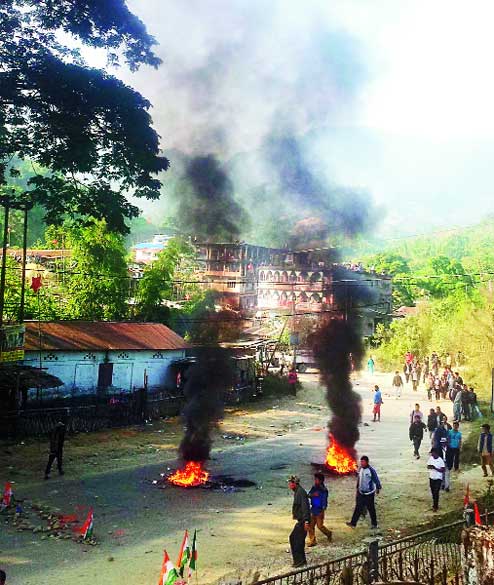
in the Assembly. Picture by
UB Photos
Shillong, March 22: The Opposition today raised the "landless" issue in Meghalaya, an irony in a state where land belongs to the "people" but a majority of the population owns no land.
About 76 per cent of households in the state are landless.
Raising the issue in the Assembly today through a cut motion, Opposition MLA of the Hill State People's Democratic Party (HSPDP), Ardent Miller Basaiawmoit, quoted statistics from the Socio-Economic and Caste Census (SECC), 2011, for rural India. Out of 4,85,913 households in Meghalaya, only 1,16,723 (24 per cent) households own land.
Basaiawmoit said Sikkim has the highest number of households with land, where out of 88,723 households, 53,399 (60 per cent) own land.
"It appears that those who own land are mainly influential people, while a large section of the people, also considered as the voiceless, continues to remain neglected. The price of land is skyrocketing, making it impossible for the low-income group to buy a small plot of land. In the absence of regulation, the rich continues to benefit more and more as there is no land ceiling whereby a maximum size of land holding can be fixed for an individual or a family," Basaiawmoit said.
He impressed upon the government to have a law that would empower the people and honour their rights by providing equal opportunities and benefits.
"It is always claimed that Meghalaya has a peculiar system where land belongs to the people, not the government. To me, it is peculiar because it is an irony that only 24 per cent of the households in Meghalaya own land," he said.
The MLA from Nongkrem said the original concept of the land-holding system in the Khasi community was that none of its members should live without land.
"A person without land should be allotted community land for household purposes and can also enjoy benefits from the resources available on the community land. But the situation has drastically changed these days. I strongly feel that even the autonomous district councils have miserably failed to protect the rights of the people during land allotment. The power is vested on them (councils) under the Sixth Schedule but they have also failed," the MLA said.
Stating that the government cannot be a mute spectator, Basaiawmoit advised it to identify all community land and find out how many are being surreptitiously exploited by those who are supposed to be the custodian and guardian of these plots of land.
He also said the government must fix the responsibility on those involved in selling of community land.
Opposition MLA of the United Democratic Party (UDP) from Sohra, Titosstarwell Chyne, also shared Basaiawmoit's concern and asked the government to take measures in acquiring land for the landless.
He also stressed the need to conduct a cadastral survey along with the autonomous district councils in order to have proper land records.
The Sohra MLA also asked the government to take back land under encroachment, like the seven-acre Maxwelton Estate as well as catchment areas in possession of the defence authorities in the city.
UDP legislator from Nongthymmai, Jemino Mawthoh, who termed the land tenure system in the state an issue of "ambiguity", said the emergence of different categories of land holdings, like community land, ancestral land, public land and private land has led to alienation and strained relationships as far as ownership, occupancy and control rights are concerned.
National People's Party legislator from Dadenggre, James K. Sangma, asked the government to adopt "land use planning" because of the burgeoning population and to ensure that agricultural land is not sacrificed for setting up industrial units like brick kilns.
"Such units should be set up only in designated industrial area, not on agricultural land," he said.
He also asked the government to pay compensation to victims of flash floods that occurred in Garo hills in 2014.
UDP legislator from West Shillong, Paul Lyndoh, asked the government to take measures to encourage villagers, including those along the border with Assam, to register their land. He said revenue officials of the state should go to the border belt, interact with the populace there, look at their land records and conduct micro-mapping of their holdings.
In his reply, deputy chief minister R.C. Laloo told the House that the government would look into the regulation and sale of land in the state and termed the issue a "very sensitive" one. "Regulations of land sale and purchase need to be examined properly. We have to treat this issue cautiously but the government is not running away from its responsibilities," he said.
Laloo said the revenue department was conducting a survey of government land to have proper data.
According to Laloo, people of the state fear that if their holdings are surveyed, they might be taxed.










